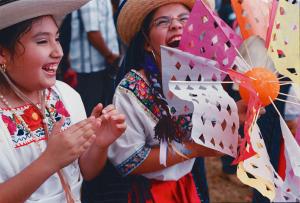Issue Date: April 25, 2003 Tune the ear, untwist the tongue and make a Latino
connection Tune the ear, untwist the tongue and make a Latino
connection
By DEMETRIA MARTINEZ It’s official: Latinos are now the largest minority in the United States. At 37 million we have exceeded the numbers of African-Americans, according to Census Bureau data released in January. How will the white majority of U.S. citizens digest the news? Only two weeks before the bureau published the data, a white woman in Phoenix looked me straight in the eye as she picked at her lettuce, which was served to her by a Latino (and no doubt picked by one), and said, “It’s turning into Mexico here.” Not all racism is so blatant. It takes the form of intellectual sloth among the media’s talking heads who, when talking race, can’t think outside of the black and white box. This is true even among leftists. As I’ve written before, the most significant books and documentaries about the 1960s largely ignore the Chicano movement, and Latino activism against the Vietnam War. (See Elizabeth Martinez’s analysis in De Colores Means All Of Us: Latina Views for a Multi-Colored Century, published by South End Press). White intellectuals who should know better are hard pressed to name a dozen of the top Latino intellectuals in this country. And in progressive church circles, tokenism remains rife. It is easy enough to squeeze Latino concerns onto agendas, or to scare up a Latino to give a workshop at a church conference. It is something else altogether to set agendas aside and to get to know us -- from university professors to undocumented workers -- as equals. My state of the union spiel on white-brown relations is not all bleak, however. One of the most heartening things we’re witnessing today is the growing numbers of non-Latinos who want to learn to speak Spanish, and who are urging their children to do so. It makes sense. Of the 37 million Hispanics living in the United States, 30 million of these speak Spanish. Worldwide, there are more than 400 million native Spanish speakers. The labyrinth of language, after all, leads straight to the heart of a culture. It gives one a feel for a people, besides a means to communicate. The word ojalá, for example, means, “I hope so,” or “hopefully.” Ojalá has its roots in Moorish Spain; you can hear the echo of the word, allah. To hope is to hope in God. Many Latinos, even the agnostics and monolingual English-speakers among us, pepper conversations with the name of God. We could be talking about the price of gasoline. We catch ourselves sounding just like our grandmothers: “God-willing.” “Thanks be to God.” On TV the other night a Saudi Arabian prince speculating on the war said, “God only knows.” I’m often asked what is the best way to go about learning or improving one’s Spanish. My advice: Total immersion begins at home. Every year countless folks pack their Birkenstocks and set out for Guatemala, joining the linguistic tourists my father calls the “sandalistas.” They come back and, all too often, lose it because they don’t use it. Still others talk wistfully of making such a pilgrimage; meanwhile they spend a small fortune on books and tapes -- but can’t get it together to drive across town (or walk down the street) to attend Spanish Mass.
I bring up Spanish Mass because, for Catholics, the liturgy offers a perfect way to tune the ear and untwist the tongue. We are already intimate with the cadences and content of the English-language Mass. We’ve heard it all a million times before and a million times the words have soothed and renewed us. In such an ambience the mind translates, almost organically, from Spanish to English and back again. Introduce music and whole new regions of the brain light up. Parish task forces or grassroots organizations that conduct their affairs in Spanish offer other venues for learning. The student of Spanish, perhaps not yet prepared to speak, should sit back and listen in silence for months if need be --not only to words but also beyond words to the very music of communication. One does not acquire a language like a wardrobe. Instead, we must be present to others, humbly open to learning from the “strangers” among us. So much of learning another language is about relinquishing power, and being OK with feelings of fear or embarrassment. English-speakers can be shamefully oblivious to the power we wield, how we control the discourse among those whose English is less-than-perfect, or who speak with an accent. The true student is willing to walk in another person’s huaraches. Learning another language is more than a linguistic endeavor. It is a spiritual one. Word by word, we fall in love not so much with a vocabulary but with a people. If we become fluent, fine. If not, that’s fine too. It’s the expression of solidarity that counts, the word made flesh in our yearning to connect. Demetria Martinez writes from Tucson, Ariz. National Catholic Reporter, April 25, 2003 |
